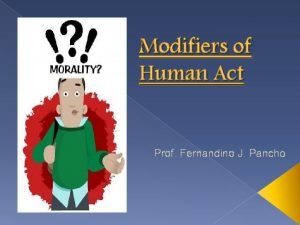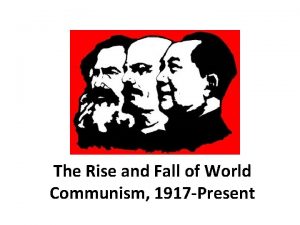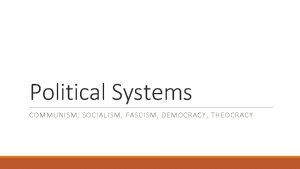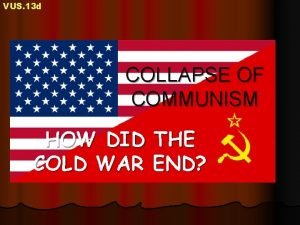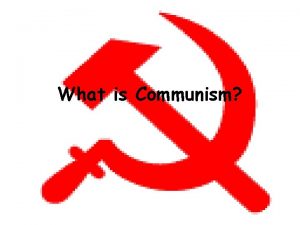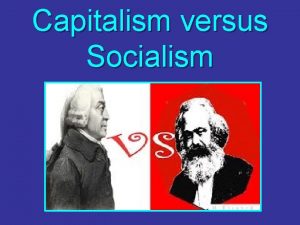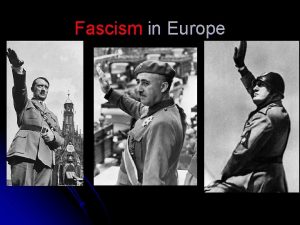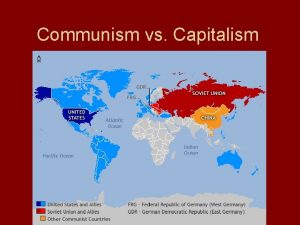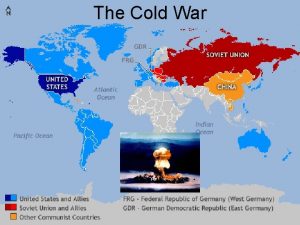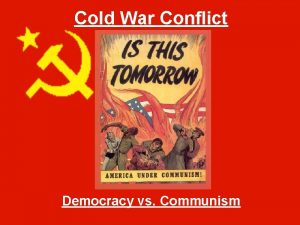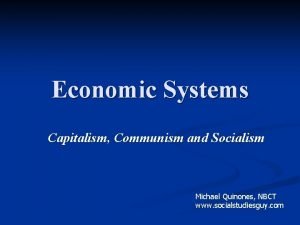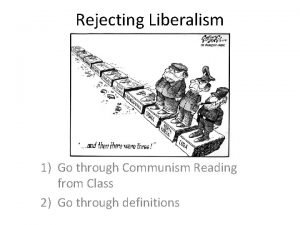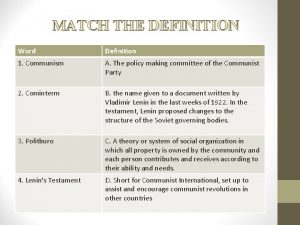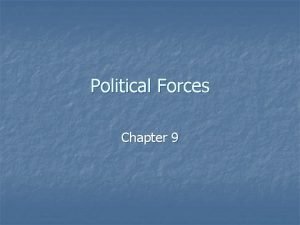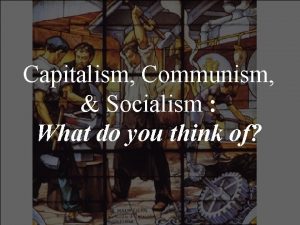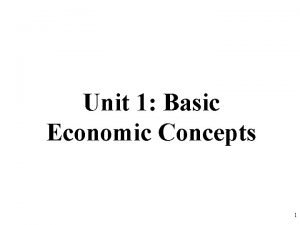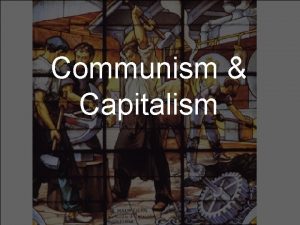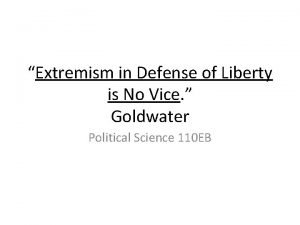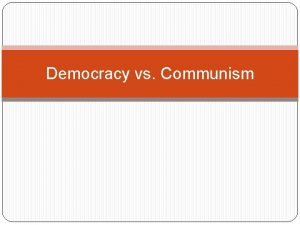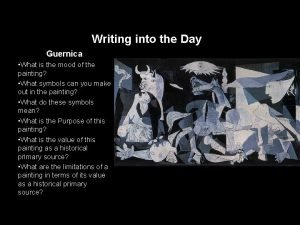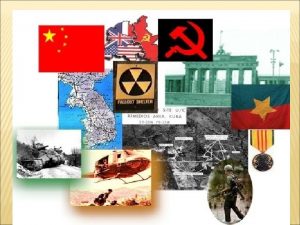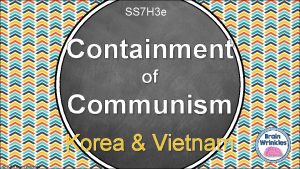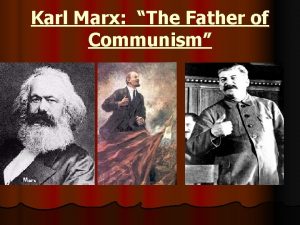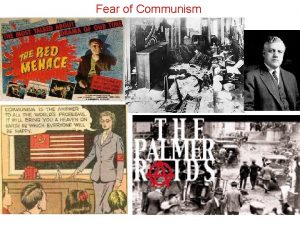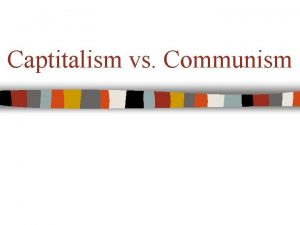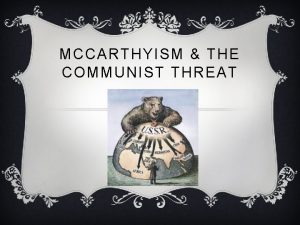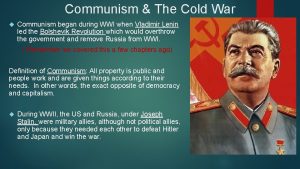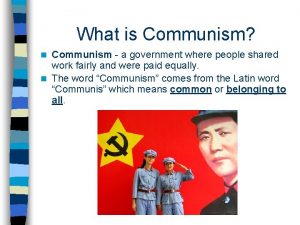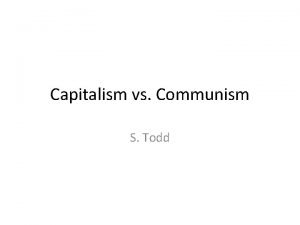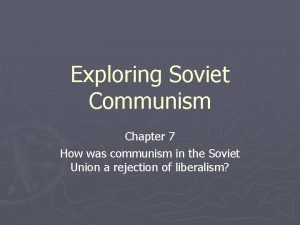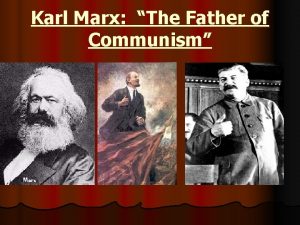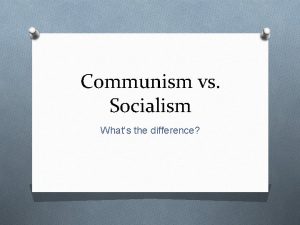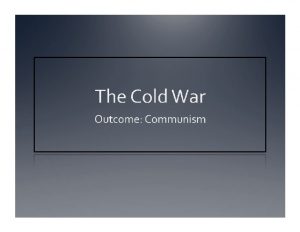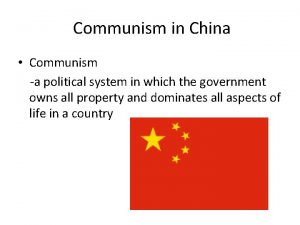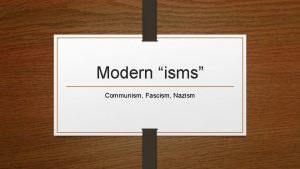The 1920 s 30 s Fear of Communism


































- Slides: 34

The 1920 s & 30 s

Fear of Communism • In 1919 fear of Bolshevism swept through Europe (also known as "Red Scare") • Civil war in Russia raged as the Bolsheviks were defeating their numerically superior "White" opponents • Communist revolutionaries took over Berlin for a week in January, 1919

The Weimar Republic • The Social Democratic Party (S. P. D. ) took control of the German government on November 9, 1918 • Kaiser Wilhelm II abdicated that same evening • The S. P. D. had been the largest party in Germany prior to the war • Fear of communist revolutions throughout the country prompted Philip Scheidemann to proclaim a republic, but without official consent from any other parties.

The Weimar Republic • Threats from the Left • Germany's lack of experience with democratic traditions made the Weimar's hold on power tenuous • The Weimar Republic had to rely on conservative military groups to save it from communist outbreaks throughout the country • This hurt the republic's prestige • The gov't was given support by the military provided that the gov't maintain discipline in the army and root out Bolshevism • In effect, the Weimar gov't became a prisoner of the German army

The Weimar Republic • "Freikorps" (Free Corps), right-wing paramilitary groups that formed after the war, became the vanguard of anti-communist repression • Spartacists, a group of communists led by Rosa Luxemburg and Karl Liebknecht, took control of Berlin for a week in January 1919. • Elements of the "Freikorps" crushed the communist uprising, killing its leaders

The Weimar Republic • Elections in January created a center-left coalition in charge of running the government • S. P. D. had the most seats in the Reichstag but also shared power with the Center Party and the German Democratic Party. • The capital was moved to Weimar to distance the gov't from the Prussian imperial traditions of Berlin

Treaty of Versailles (1919) • To Germans of all political parties, the Versailles Treaty represented a harsh, dictated peace, to be revised or repudiated as soon as possible. • Article 231 placed sole blame of the war on Germany. • Germany required to pay enormous reparations to Britain and France • Germany's military strength severely weakened • Germany lost eastern territory to Poland • East Prussia was separated from the rest of Germany by the "Polish Corridor" that extended north to the Baltic Sea.

Germany Loses Territory to France • Germany lost Alsace & Lorraine to France • French troops would occupy territory west of the Rhine River and a small strip of land east of the Rhine to ensure against German aggression. • These territories were to be permanently demilitarized • France took economic control of the Saar border region which was rich in coal and iron mines • The region would be administered for 15 years by the League of Nations • After 15 years, the people of the Saar could vote on whether to remain part of Germany or become part of France. • France was eager to punish Germany (but even more eager to ensure its future security against German aggression)

British Attitudes Toward Germany • While Britain also sought to punish Germany, many Brits believed a healthy German economy was essential to a healthy British economy. • John Maynard Keynes (most significant economist of 20 th century) criticized Versailles Treaty, declaring its punishing of Germany would damage the European economy • Economic Consequences of the Peace, 1919

German Dissatisfaction • The Weimar Gov't in June 1919 signed the Versailles Treaty probably dooming the Weimar Republic from the start • Conservatives, including influential military elements, saw the signing of the treaty as a "stab in the back" or the "diktat" -the "dictated peace"

A New German Constitution • New Constitution created in August 1919 • Reichsrat: upper chamber represented the Federal states. • Reichstag: lower house elected by universal suffrage; supplied the Chancellor and Cabinet. • President elected for a 7 -year term. • Female suffrage granted

The Weimar Republic • Threats from the Right • Kapp Putsch, 1920 • Conservative politicians and businessmen, with help from disgruntled army officers, took control of Berlin in March and declared a new government • Conservative parties gave their support • At the same time, right-wing conservatives took control of Bavaria

The Weimar Republic • Chancellor Ebert implored workers to defend the Weimar Republic • A general strike resulted which brought the country's economic activities to a halt • The putsch collapsed as a result and the republic was saved • Though certain conservative groups failed to take power forcefully, they continued to gain seats in the Reichstag • The S. P. D. eventually withdrew from the government leaving a fragile center-right coalition in charge.

The Ruhr Crisis (1923) • Reparations: As provided for in the Versailles Treaty, the Allies announced in 1921 that Germany had to pay almost $34 billion in reparations • Germany's economy was still weak and it could not pay all of the reparations. • 1923, France, led by Raymond Poincare, occupied the industrial Ruhr region of Germany. • In response, the Weimar gov't ordered Ruhr residents to stop working & passively resist French occupation.

Inflation • Runaway inflation occurred when Germany printed money to pay reparations • The value of the German mark went from approximately 9 marks per U. S. dollar in 1919 to 4. 2 trillion marks per dollar by mid-November 1923! • Brought about a social revolution in Germany: Accumulated savings of many retired and middle- class people were wiped out • Middle-class resented the gov't and blamed Western gov't, big business, workers, Jews, and communists for nation's woes.

Beer Hall Putsch (1923) • Beer Hall Putsch, 1923: Adolf Hitler and the Nazi Party failed to overthrow the state of Bavaria and Hitler was sentenced to one year in jail (where he wrote Mein Kampf. ) • Hitler's light jail term reflected conservative judges who sympathized with antirepublican views.

The Weimar Republic • Gustav Stresemann assumed leadership in 1923 • Called off passive resistance in Ruhr and agreed to pay reparations (but also sought consideration of Germany's ability to pay) • Poincare agreed • Supported by Social Democrats • Stresemann restored Germany to normal status in the European community with the Locarno Pact in 1925

Dawes Plan (1924) • Dawes Plan, 1924: League of Nations plan that restructured Germany's debt with U. S. loans to Germany to pay back Britain and France, who likewise paid back the U. S. • Resulted in German economic recovery • Young Plan (1929): continuation of Dawes Plan (moot when Great Depression hit)

Germany Rejoins the World Community • Locarno Pact, 1925: Germany and other European nations agreed to settle all disagreements peacefully. ("spirit of Locarno" = peace) • Germany allowed to join League of Nations in 1926 • In return, Germany had to guarantee western borders with France and Belgium • Disagreement over Germany's eastern border with Poland remained unresolved • Kellogg-Briand Pact, 1928: Renounced war as "illegal" except for selfdefense; signed by 62 nations but had no real enforcement mechanism

France • Economic problems • Challenges were similar to those in Germany • Death, devastation, and debt of WWI created economic chaos and political unrest • Throughout the 1920 s, the government's multi-party system was dominated by parties on the right (conservatives) • Supported status quo and had backing of business, army, and Church. • 1926, Raymond Poincare was recalled to office • Gov't slashed spending and raised taxes, restoring confidence in the economy.

Great Britain • Wartime trend toward greater social equality continued, helping maintain social harmony. • Representation of the Peoples Act (1928): women over 21 gained the right to vote. (Representation of Peoples Act of 1918 had given women over 30 the right to vote). • Yet, the concentration of wealth in Britain was more geared towards the top than any other European country • Top 1% owned 2/3 of the national wealth

Great Britain • Unemployment was Britain's biggest problem in 1920 s: about 12% • Did not recover from economic losses suffered during WWI • 1926, General Strike: support of miners who feared a dramatic drop in their low wages swept the country. • The strike eventually failed • Gov't outlawed such "sympathetic" labor strikes in 1927

Great Britain • Growth of social welfare • After WWI, the gov't provided unemployment benefits of equal size to the unemployed and supplemented those payments with subsidized housing (200, 000 units), medical aid, and increased old-age pensions.

Great Britain • Labour party rose as a champion of the working classes and of greater social equality and took power briefly in 1924 (9 months) • Led by Ramsay Mac. Donald • Labour Party came to replace the Liberal Party as main opposition to conservatives. • Liberal party's traditional 19 th century support of free trade no longer seemed as relevant

Great Britain • Conservatives regained power by framing the Labour party as procommunist when it officially recognized the Soviet Union • Conservatives under Stanley Baldwin (1867 -1947) ruled Britain between 1924 and 1929. • Showed the same compromising spirit on social issues: female suffrage, expanded pensions to widows, orphans and the elderly.

The Irish Question • After Easter Rebellion (1916) the extremist Sinn Fein faction gained prominence in Ireland. • Prompted a civil war between the Irish Republican Army (IRA) and the Black and Tan, England's special occupation forces there. • October 1921, London created the Irish Free State, from which Ulster withdrew, as part of the British Commonwealth (Northern Ireland) • In 1922, Britain granted southern, Catholic Ireland full autonomy after failing to suppress a bitter guerrilla war.

Great Britain Begins Decolonizing • Loosening of the empire • End of its protectorate in Egypt (except Suez Canal) • Equality of British Dominions - Canada and Australia

The Great Depression (1929 -1933) • Causes • Long-term problems within the U. S. economy: weak international economy, overproduction, unstable banking, certain weak industries, 1/2 of all Americans lived below poverty line. • Overproduction of agriculture in Europe (drove prices down thus hurting farmers) • Stock Market Crash (1929) may have triggered U. S. depression that spread world wide • In 1931, Britain went off the gold standard; 20 other countries followed suit

The Great Depression (1929 -1933) • 1930, U. S. instituted extremely high Hawley-Smoot Tariff which resulted in retaliation by 23 other countries. • New York bankers began recalling loans made to Germany and other European countries, thus exacerbating Europe's economic crisis.

Depression’s Impacts on Europe • Shattered the fragile optimism of political leaders in the late 1920 s • Decline of production occurred in every country (except Russia with its command economy). • Mass unemployment resulted: Germany hit hardest (43%); Britain 18%, U. S. 25%

Attempted Remedies • Franklin Roosevelt's "New Deal" in U. S. sought to reform capitalism with increased gov't intervention in the economy • Influenced certain European countries • Keynesian approach (developed by John Maynard Keynes) used after 1938 to permanently prop up the economy through public works programs and subsidies. • Scandinavia's response to depression was most successful under its socialist gov't

British Recovery • Orthodox economic theory followed after 1929: abandoned gold-standard, reorganized industry, increased tariffs, reformed finances, cut gov't spending, balanced budget (although unemployed workers received barely enough welfare to live on) • Economy recovered considerably after 1932. • Years after 1932 actually better than in the 1920 s. • Like the U. S. , Britain came out permanently from depression due to rearmament for WWII

France • Impact of the depression didn't occur immediately as France wasn't as highly industrialized as Britain, Germany & the US • The depression increased class tensions and gave birth to a radical right that supported gov't reorganization along fascist lines. • Popular Front: Threat of fascism prompted coalition of republicans, socialists, communists and radicals • Popular Front led by Leon Blum

France • "French New Deal": Inspired by U. S. New Deal, encouraged union movement and launched far- reaching program of social reform, complete with paid vacations and a 40 -hr work week. • Failed due to high inflation and agitation from fascists and frightened conservatives in the Senate. • French divisions over what actions to take in the Spanish Civil War destroyed the Popular Front in 1936 • France remained politically divided as Germany continued its rearmament in late 1930 s
 Ignorance overcame by the use of ordinary effort
Ignorance overcame by the use of ordinary effort Marxist theory
Marxist theory Theocratic communism
Theocratic communism Communism
Communism Communism
Communism Communism meaning simple
Communism meaning simple Communism
Communism Capitalism versus communism
Capitalism versus communism Fascism vs communism chart
Fascism vs communism chart Copyright
Copyright Disadvantages of communism
Disadvantages of communism What's good about communism
What's good about communism Command economy
Command economy What is a satellite nation
What is a satellite nation Democracy vs communism cold war
Democracy vs communism cold war Capitalism communism socialism fascism
Capitalism communism socialism fascism Utopian socialsim
Utopian socialsim Communism
Communism Match the following terms with their definitions communism
Match the following terms with their definitions communism Communism
Communism What is communist government
What is communist government Disadvantages of communism
Disadvantages of communism Feudalism capitalism socialism communism
Feudalism capitalism socialism communism Extremism is no vice
Extremism is no vice Socialism vs communism
Socialism vs communism Democracy vs communism political cartoon
Democracy vs communism political cartoon Fascism vs communism chart
Fascism vs communism chart Communism cold war
Communism cold war Containment of communism cloze notes
Containment of communism cloze notes Collectivism ideology
Collectivism ideology Capitalism communism socialism fascism
Capitalism communism socialism fascism Communist vs socialist
Communist vs socialist What are the characteristics of communism
What are the characteristics of communism Communism
Communism Designed by
Designed by
